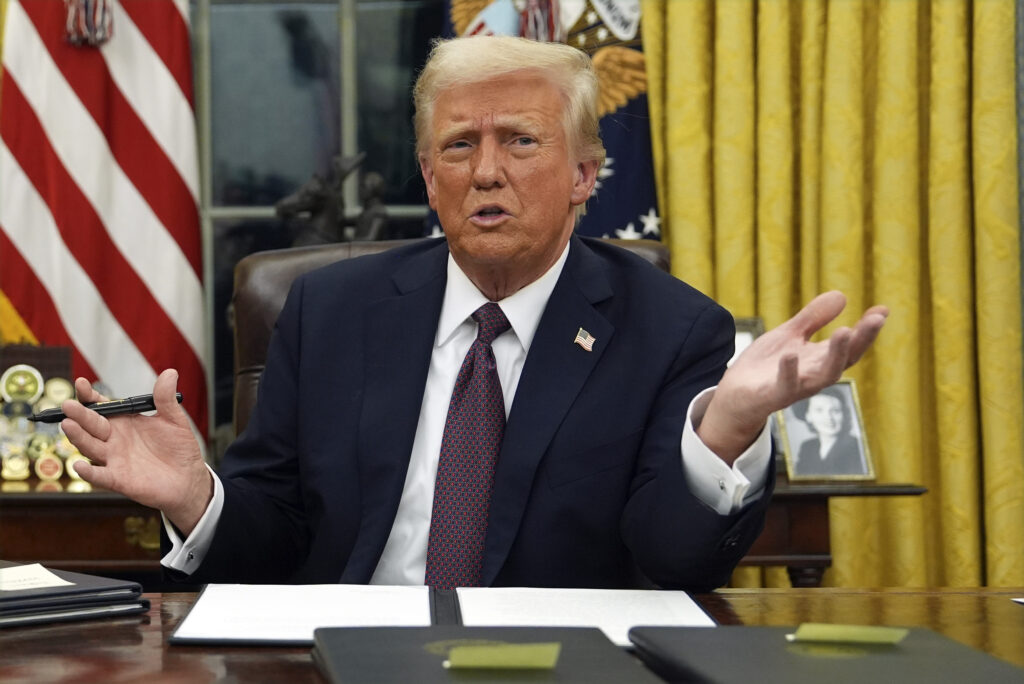Federal Judge Temporarily Blocks Trump’s Order Restricting Birthright Citizenship

A Republican-appointed federal judge granted a request from Democratic attorneys general in Arizona, Illinois, Oregon and Washington to temporarily halt the implementation of President Trump’s executive order purporting to end birthright citizenship for children born in the United States to undocumented parents or parents who have lawful but temporary residency status.
The 14-day, nationwide temporary restraining order issued from the bench by Judge John C. Coughenour comes after the quartet of states filed a federal complaint Tuesday contending that the newly signed executive order flouts the 14th Amendment’s Citizenship Clause — which automatically confers citizenship to those born in the United States — as well as federal immigration law.
Coughenour, an 84-year-old Reagan-appointee who held a hearing in Seattle today, said “I have been on the bench for over four decades. I can’t remember another case where the case presented is as clear as it is here …This is a blatantly unconstitutional order.”
“There are other times in world history where we look back and people of goodwill can say where were the judges, where were the lawyers?”
Originally set to take effect Feb. 19, Trump’s so-called “Protecting the Meaning and Value of American Citizenship” executive order specifically targets the children of parents who are either “unlawfully present” or “temporary but lawful” citizens at the time of their birth.
Coughenour’s temporary ruling will prevent Trump’s executive order from going into effect for now as he weighs whether to issue a preliminary injunction that would block the order in the longer term.
The four Democratic attorneys general — who filed suit Tuesday in the U.S. District Court for the Western District of Washington — referred to Trump’s unilateral dictate as a “Citizenship Stripping Order.” They argue the recent mandate runs afoul of the U.S. Constitution and seeks to upend the U.S. Supreme Court’s 1898 ruling in United States v. Wong Kim Ark that cemented birthright citizenship for U.S.-born children of immigrants.
“There is a strong likelihood that Plaintiffs will succeed on the merits of their claims that the Executive Order violates the Fourteenth Amendment and Immigration and Nationality Act,” Thursday’s ruling reads.
According to the legal action, the executive order would likely render at least 12,000 babies born in the United States each month undocumented — stripping them of the right to receive federal benefits like Social Security and preventing them from being able to work lawfully, travel freely, vote, run for office or serve on juries. The attorneys general also underscored that those who are deprived of lawful citizenship status under the order would be at risk of detention and deportation.
What’s more, the lawsuit alleges that the Citizenship Stripping Order would cause direct economic harm to the four plaintiff states by causing them to lose out on “federal funding or reimbursements to programs that the Plaintiff States administer, such as Medicaid, the Children’s Health Insurance Program, foster care and adoption assistance programs, and programs to facilitate streamlined issuance of [Social Security numbers] to eligible babies—among others.”
In addition to the Washington State-based case, five other legal challenges have been mounted against the sweeping executive action — three led by immigrant and civil rights groups, one from an individual and another from a coalition of 18 Democratic states joined by Washington, D.C. and San Francisco.
Like the Washington case, the other legal challenges note that the 14th Amendment’s guarantee of birthright citizenship was ratified in the wake of the Civil War to overturn the Supreme Court’s infamous Dred Scott decision, which held that individuals descended from enslaved Black Americans were not entitled to citizenship.
“The President has no authority to override or ignore the Fourteenth Amendment’s Citizenship Clause or otherwise amend the Constitution unilaterally, and therefore lacks authority to strip individuals of their right to citizenship,” the complaint from 18 Democratic attorneys general reads.
Cody Wofsy, deputy director of the ACLU’s Immigrants’ Rights Project and lead attorney on one of the cases brought by a New Hampshire immigrant rights nonprofit said in a statement that “denying citizenship to babies born on U.S. soil is illegal, profoundly cruel, and contrary to our values as a country.”
The Trump administration is likely to appeal an eventual preliminary injunction ruling in the case to the 9th U.S. Circuit Court of Appeals. Meanwhile, federal judges presiding over the other five cases throughout California, Maryland, Massachusetts and New Hampshire could also weigh in on requests to immediately block the executive order in the coming days and weeks.